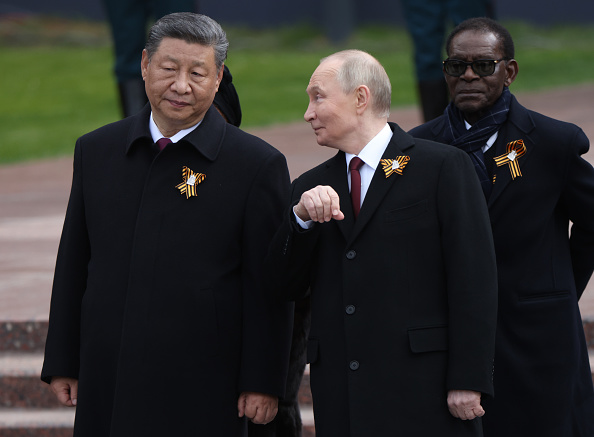The European Union’s dream of strategic autonomy lies in tatters, undermined by the United Kingdom, a non-EU power, steering talks to sell 40 Eurofighter Typhoon jets to Turkey. No contract is inked, yet the UK’s push, NATO’s applause, and Italy’s greedy deals expose a continent grovelling to outsiders.
Turkey, a NATO colossus that threatens war over maritime rights and spits on European norms, is the West’s strategic schizophrenia incarnate. Germany’s spineless dithering and the EU’s mute complicity scream one truth: Brussels is a mere bystander, impotent in its own security theatre. This isn’t a deal. it’s a surrender.
The UK’s gambit for 40+ Eurofighters (20 new Tranche 4 jets, 20+ used Tranche 1s) is gaining steam but remains unsigned. In March 2025, the UK Ministry of Defence floated a price proposal, eyeing deliveries from 2026-2028, as Reuters reports.
“The United Kingdom supports Turkey’s potential purchase of Eurofighter Typhoon”, said UK Defence Minister Maria Eagle, salivating over a $5 billion windfall for BAE Systems. Turkey, exiled from the F-35 program in 2019 for buying Russia’s S-400, craves the Typhoons to patch its F-16 fleet until its own stealth-fighter KAAN jet takes off in 2030.
The deal needs clearance from the whole Eurofighter consortium: UK, Germany, Italy, Spain. Germany’s April 2025 veto, sparked by Turkey’s jailing of opposition leader Ekrem İmamoğlu, has now all but been removed, with Chancellor Friedrich Merz heralding a more lenient approach. And then there is NATO, which wants a powerful Turkey as a counterbalance to Russia.
Last week in Antalya, NATO Secretary General Mark Rutte called Turkey a “staunch and capable ally”, vital for Ukraine peace talks. Its 600,000-strong army, bloodied in Turkish Kurdistan, Syria and Libya, props up NATO’s southern flank. Turkey’s position, connecting Europe, Asia and the Middle East, makes it a geopolitical treasure. Its defence industry is booming.
Yet, Turkey’s claws are sharp. Since 1995, it’s held a casus belli against the EU itself: If Greece rightfully extends its Aegean waters from 6 to 12 miles or claims its full exclusive economic zone (EEZ) under the UN Convention on the Sea (UNCLOS), war looms. Turkey, dodging UNCLOS, claims this chokes its Aegean access, ignoring passage rights. This defies the UN Charter, but NATO stays mum, worshipping Turkey’s might over morals.
Turkey’s 1974 Cyprus invasion, occupying 37 per cent of an EU member, also laughs at UN resolutions. Erdogan’s 2025 “two-state” push is a diplomatic middle finger. In Syria, Turkey’s anti-Kurdish strikes, targeting US and EU anti-ISIS allies, breed chaos. Its 2020 backing of Azerbaijan’s Nagorno-Karabakh blitz proved that Ankara is always willing to join a lucrative fight. At the same time, Turkey’s S-400 buy and Russian energy ties — TurkStream pipeline and the Akkuyu nuclear plant — mock NATO’s anti-Russia stance.
But Turkey is getting stronger, and its geopolitical heft shines in Istanbul’s Ukraine peace talks. Rutte, on May 13, 2025, praised President Erdogan as “an amazing leader within NATO,” noting Turkey’s “big role” in hosting Russian and Ukrainian delegations. Turkey’s stage for these talks cements its clout, steering global diplomacy where the EU falters. This swagger underscores why NATO and Europe court Ankara.
Italy, a consortium partner, lusts after Turkey’s defence industry. In March 2025, Turkish technology company Baykar and Italian aerospace company Leonardo inked a drone deal for Europe’s $100 billion market. Germany brags of military rebirth. March 2025 saw billions pledged to rearm, eyeing a Bundeswehr to rival Russia, Der Spiegel reported. Yet, its Eurofighter U-turn reveals cowardice. Merz’s “constructive” talks on the sale, noted by Rutte on May 14, 2025, betray Germany’s leadership pretensions.
The UK’s post-Brexit play is surgical. Championing Eurofighter talks and sniffing KAAN engine deals, London fortifies its defence sector and chains Turkey to NATO, castrating the EU. The EU’s Permanent Structured Cooperation (PESCO) and the European Defence Fund, meant to create autonomy, rot in red tape. France, once Turkey’s critic, now greenlights Meteor missiles for the Typhoons, kneeling to NATO.
Asli Aydintaşbaş of Brookings warns, “Turkey will play a role in Europe’s future security architecture,” but Brussels is a puppet. The EU’s failure to shield Cyprus or counter Turkey’s UNCLOS-defying threats betrays a union too weak to protect its own. Of course, Turkey’s Black Sea clout could help in post-Ukraine rebuilding. And yes, its drones are NATO gold. But if the EU does not force concessions on Ankara, it risks bankrolling and arming a renegade.
The Eurofighter farce is a klaxon. The EU was supposed to free its defence from the UK and NATO and support PESCO. It is supposed to enforce UNCLOS, and strive for the security of its members. Germany’s rearmament, or Italy’s lust for cash should and could fall under a European vision.
Lead or be led, they say. And one last thing: If Brussels bureaucrats and the EU nomenclature really count on getting in bed with Erdogan so as to counter Putin, it will be the stupidest thing they have ever done. Turkey is a serious player, who, unlike European leaders, only fights for its own people and interests.





Turkey and the EU’s defence dilemma: a partner too far?